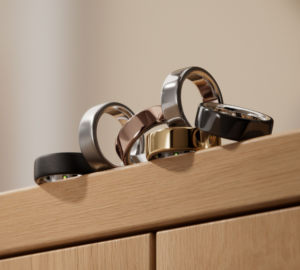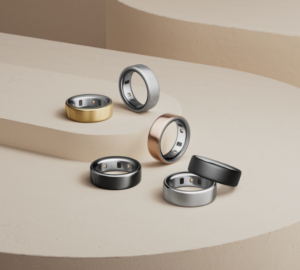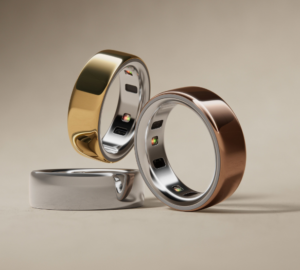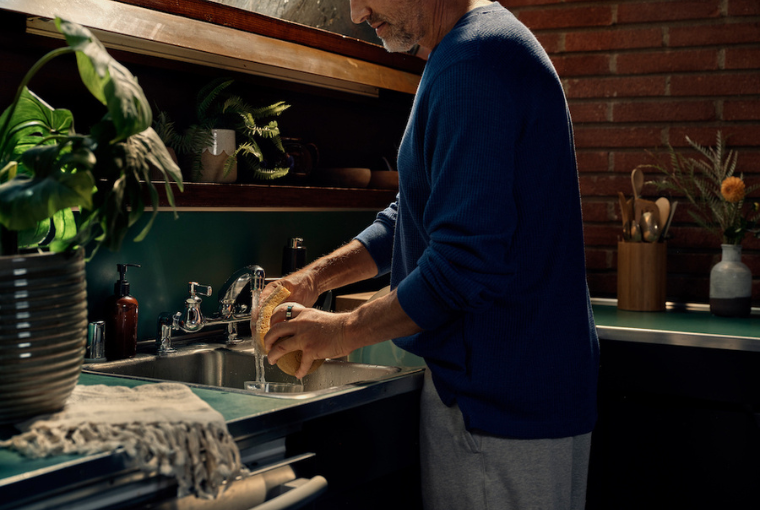Have you noticed that some people are up and ready to go at sunrise, while others don’t feel fully functional until lunchtime? You can find some comfort in knowing that no matter what time you go to bed, how easy it is for you to wake up in the morning is largely predetermined, thanks to your chronotype.
Your chronotype is another way of saying whether you’re a morning person, a night person, or somewhere in between. This natural inclination is often referred to as your sleep chronotype. It’s strongly determined by your genetic makeup, and reflects your individual circadian rhythm, or your body’s approximate 24-hour internal clock, which regulates alertness, digestion, and hormone release.
| Member Tip: Oura members can discover their chronotype, as well as a Body Clock that helps them understand their sleep patterns, after 90 days of using Oura. For more information on these features, visit the Body Clock and Chronotype Help Center article. |
How Oura Determines Your Chronotype
Oura analyzes your sleep, activity, and body temperature data from the past 90 days to determine your Oura chronotype.* You must wear your Oura Ring consistently during night and daytime, in order for Oura to accurately provide your chronotype.
Here are the six chronotypes as classified in the Oura App:
- Early morning type: You feel awake, alert, and energetic in the early mornings. For you, morning is the time to do a workout and intellectual work alike. You’ve already tackled many of the day’s tasks by the time evening types are only starting. Less than 10% of people are early morning types.
- Morning type: You love getting up with the sun and going to bed early. You tend to be alert and energetic in the mornings, which makes a good start to the day.
- Late morning type: You are more of a morning type but not to the extreme (intermediate in some classifications). You tend to be most productive in the mornings. You enjoy going to bed early most evenings, but you don’t mind the occasional late night either.
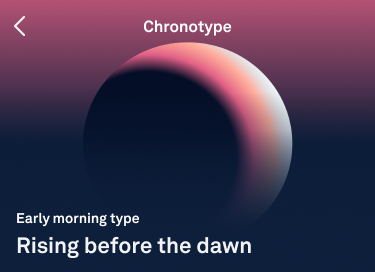 |
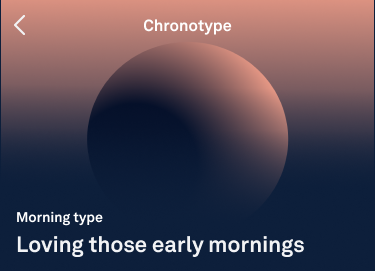 |
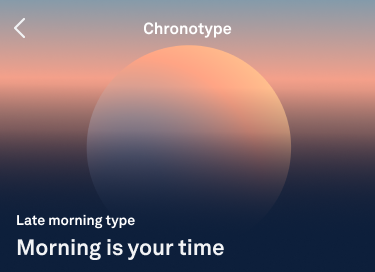 |
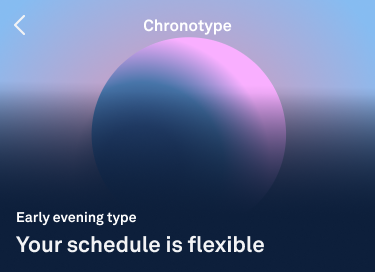 |
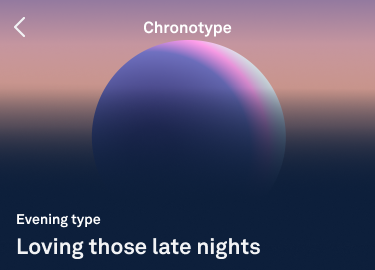 |
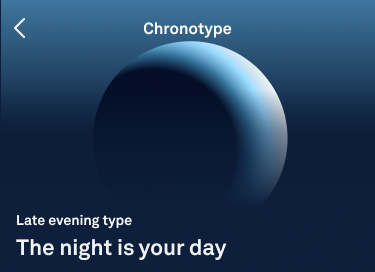 |
- Early evening type: You are more of an evening type but not to the extreme (intermediate in some classifications). You enjoy the occasional late night but don’t mind going to bed early either. Keeping to social schedules feels easy for you even if you could do without too many early mornings.
- Evening type: As an evening type, you cherish your late nights! As others start to wind down, you become more awake and alert.
- Late evening type: You need your sleep in the mornings. Don’t feel guilty about it, it is good for your body and mind. On some days you may not feel fully awake until the afternoon. Less than 10% of people are late evening types.
READ MORE: Oura Data Shows How Members’ Chronotypes Vary By Age, Gender, and Country
Why Does Your Chronotype Matter?
Knowing and living according to your sleep chronotype can benefit your energy levels, sleep, and overall well-being. Research has shown that circadian misalignment and irregular sleep-wake cycles are associated with higher risks of disease.
Circadian misalignment is the discrepancy between sleep-wake cycles and clock-regulated physiology. The discrepancy happens when your natural circadian rhythm is interrupted by your daily demands like waking up early for school or doing shift work.
That’s in part why shift work is linked to higher levels of hypertension, inflammation, and cardiovascular disease. A randomized controlled trial found that circadian misalignment caused by shift work increased blood pressure, decreased heart rate variability, and increased C-reactive protein (a key marker of inflammation).
A study published in Scientific Reports examined the effects of irregular sleep/wake patterns in a group of undergraduate students, highlighting the impact of disregarding one’s sleep chronotype. The researchers found that participants with circadian misalignment had lower academic performance.
For instance, those with evening chronotypes “will have, on average, a two-hour delay during which their bodies biologically want to wake up relative to morning types,” notes Matthew Walker, PhD, author of Why We Sleep and an Oura advisor. A drop in body temperature, which is critical for sleep, is also delayed by about two hours in evening types relative to morning types, which can make it difficult to fall asleep at an earlier time.
What’s more: Evening types must wait about an hour longer in the morning relative to morning types before they release key hormones that help them manage stress and emotions upon awakening, Walker adds. “As a result, you cannot and should not expect night owls to operate with the same good grace and emotional intelligence at an early morning hour.” Yes, you heard that right — now all the evening types have an excuse for their morning grumpiness!
“I’d also like to empower evening types with the knowledge that they may be chronically sleep deprived,” Walker says. Though it may be unrealistic for some, Walker encourages evening types to try and find a schedule, if at all possible, that allows them to sleep more in sync with their natural predilection for sleep and wake times.
READ MORE: How This Oura Member Learned to Embrace Her “Evening” Chronotype & Align to Her Ideal Schedule
Body Clock Feature
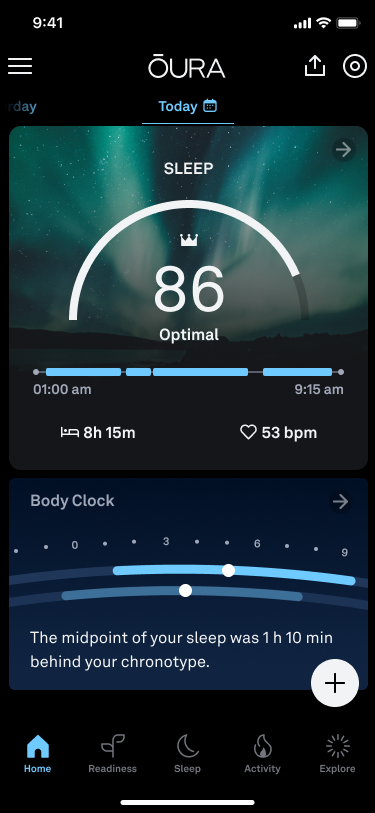 In the Oura App, the Body Clock feature helps you understand your optimal sleep schedule based on your sleep chronotype. Each day, your Body Clock graph will display a 24-hour clock face comparing your optimal sleep window and your current sleep patterns. Based on the midpoints of both, you can see how aligned your sleep was with your chronotype the previous night. If necessary, the Body Clock will provide guidance on how to adjust your sleep timing.
In the Oura App, the Body Clock feature helps you understand your optimal sleep schedule based on your sleep chronotype. Each day, your Body Clock graph will display a 24-hour clock face comparing your optimal sleep window and your current sleep patterns. Based on the midpoints of both, you can see how aligned your sleep was with your chronotype the previous night. If necessary, the Body Clock will provide guidance on how to adjust your sleep timing.
While Body Clock takes into account your chronotype and should be an aspirational sleep window, Oura also provides Bedtime Guidance, which is based on your past wake-up times. If you adjust your sleep to better align with your chronotype, you will see your Bedtime Guidance shift closer towards your Body Clock.
If you can’t always adjust your sleep schedule according to your chronotype, try to follow Bedtime Guidance for a more consistent sleep schedule, as well as these tips:
- Try to wake up and go to bed at the same time every day, on weekdays and weekends.
- Try to get plenty of light during the day and minimize screen time and artificial light towards your bedtime. Light exposure during the day can help you keep a more regular sleep schedule.
- If you are an evening person but you need to wake up early, regular physical activity in the morning can help you feel more awake and alert during the day.
*Your past 90 days of data must include at least 30 long sleep periods of 3+ hours
For more information on these features, visit the Body Clock and Chronotype Help Center article.
RELATED: How This Oura Member Learned to Embrace Her “Evening” Chronotype & Align to Her Ideal Schedule
About the Oura Expert
Matthew Walker, Ph.D., is a professor of neuroscience at UC Berkeley, and founder and director of the school’s Center for Human Sleep Science.
Professor Walker is the author of the New York Times and international bestseller, Why We Sleep: Unlocking the Power of Sleep and Dreams. Professor Walker’s TED talk, “Sleep is your Superpower,” has garnered over 16 million views to date. His research examines the impact of sleep on human health and disease. He has been featured on numerous television and radio outlets, including CBS 60 Minutes, National Geographic Channel, and more, and hosts the 5-star-rated, The Matt Walker Podcast.

